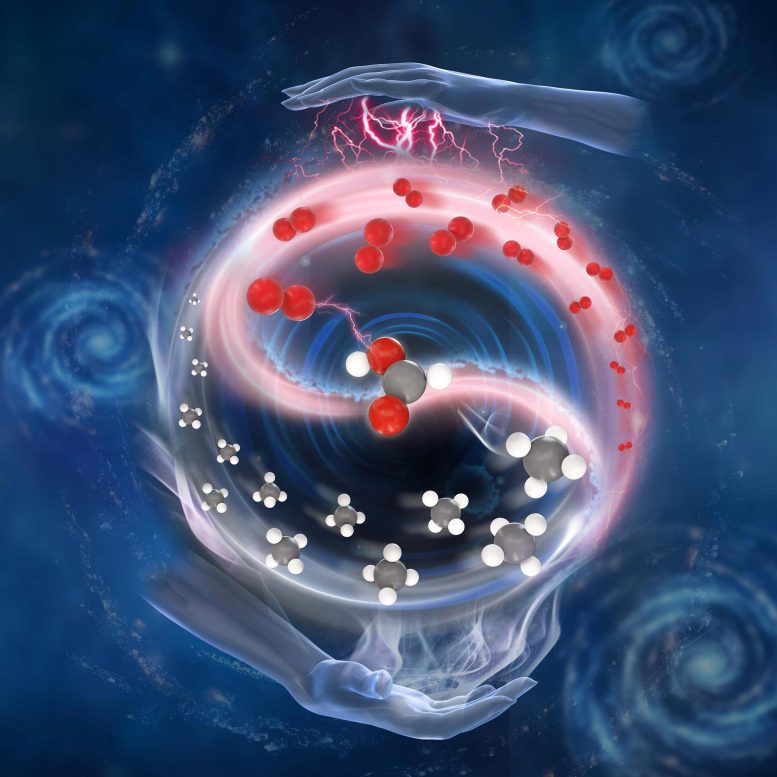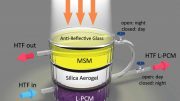
Researchers realize electrochemical conversion of CH4 and O2 to HCOOH at room temperature. Credit: JACS
A team from the Dalian Institute of Chemical Physics made a breakthrough in converting methane to formic acid using oxygen at room temperature through a high-pressure electro-Fenton process, achieving significantly higher efficiency and productivity than traditional methods.
Direct conversion of methane (CH4) and oxygen (O2) to value-added chemicals is important for natural gas industries. However, challenges remain due to the difficulty of O2 activation in forming active oxygen species for CH4 activation under mild conditions.
Recently, a research group led by Prof. Dehui Deng, Assoc. Prof. Xiaoju Cui and Liang Yu from the Dalian Institute of Chemical Physics (DICP) of the Chinese Academy of Sciences (CAS) realized the electrochemical conversion of CH4 by O2 to formic acid (HCOOH) at room temperature. This study was published in the Journal of the American Chemical Society.
The researchers developed a high-pressure electro-Fenton strategy to establish a hetero-homogeneous process for electro-catalytic conversion of CH4 by O2 at room temperature. They revealed that CH4 was efficiently activated by ·OH, which was produced via a heterogeneous electroreduction of O2 to H2O2 on the Ag foil cathode, followed by a homogeneous Fe2+-facilitated H2O2 decomposition.
Besides, the researchers found that the elevated pressure not only improved the productivity of H2O2 from O2 electro-reduction but also boosted the reaction collision probability between CH4 and active ·OH in-situ generated from Fe2+-facilitated decomposition of H2O2.
Compared with the traditional electro-catalytic CH4 conversion process with high overpotential (>0.9 V) and low Faradaic efficiency (< 60%), the high-pressure electro-Fenton process achieved an HCOOH Faradaic efficiency of 81.4% with an ultra-low cathodic overpotential of 0.38 V. The HCOOH productivity was 11.5 mmol h-1 gFe-1, which was 220 times that of ambient pressure.
“This work provides a new way for energy-efficient and sustainable conversion of CH4 by directly using O2 under mild conditions,” said Prof. Deng.
Reference: “High-Pressure Electro-Fenton Driving CH4 Conversion by O2 at Room Temperature” by Yao Song, Xiao Yang, Huan Liu, Suxia Liang, Yafeng Cai, Wenqiang Yang, Kaixin Zhu, Liang Yu, Xiaoju Cui and Dehui Deng, 26 January 2024, Journal of the American Chemical Society.
DOI: 10.1021/jacs.3c10825








In the real world, containers and their seals leak. Using more methane industrially runs the potential risk of greater leakage than what we currently experience, posing a risk of greater global warming. Just because something CAN be done doesn’t mean that it SHOULD be done. Once again, these researchers appear to be so focused on the question of IF something CAN be done that they don’t take the time to consider whether it SHOULD be done.
Research of any kind does not consider whether something can be done. Much research is never used directly because it’s uneconomical or something better is available. If a process uses less energy, then it’s better for the world. I’m not sure that this will result in more gas being used; it may result in less, as less will be needed to provide higher temperatures.
The article title “Electro-Fenton Magic Makes Methane the New Eco Fuel Hero” is completely misleading.
1) Value added products are not used as fuel, but as precursors for more valuable chemicals.
2) Methane when burnt produces more energy than formic acid.
3) Natural gas or formic acid increases net CO2 when burnt, thus is not “eco”